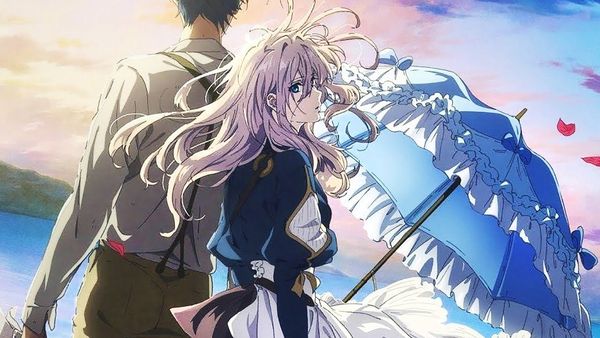Eye For Film >> Movies >> Violet Evergarden (2020) Film Review
Violet Evergarden
Reviewed by: Jennie Kermode

One of the perennial problems facing soldiers in the aftermath of conflict, as it faces prisoners after release, is the difficulty in separating oneself from the mechanics of institutionalisation and recognising oneself as a discrete human being, possessed of one's own will and pf the right to use it. In this multi-layered animé tale based on the books by Kana Akatsuki, director Taichi Ishidate explores this struggle and its particular relevance to postwar Japan through the story of a young woman who, having lost her hands in the conflict, elects to surrender her voice and use her talents to make memories for others in lieu of creating her own.
Violent (voiced by the highly capable Yui Ishikawa - there is thankfully no English dub) is a 'doll', a writer who produces eloquent letters on behalf of others. She helps them to express their feelings, to win the hearts of those they desire, even to comfort their loved ones after they are dead. When she sets her metal hands to the typewriter keys, magic happens. But what about her own story? We are told that she was created to be a tool for war, though precisely what this refers to is unclear. It may refer to the tekketsu kinnotai sometimes used in suicide attacks, or be something more fantastic (after all, Violet's prostheses were not possible in the real world at the time). At any rate, her fate is changed when she meets the Major (Daisuke Namikawa), who takes pity on her, tries to make her more human, and falls in love with her in the process. After he is lost, Violet spends years trying to understand her own feelings, gradually recognising that - as viewers will guess at the outset - she loves him too.

Some people will be understandably hesitant about a romance centred on a relationship between a superior officer and a conscript who was a child when he met her, but Violet Evergarden deftly addresses these concerns, having a strong focus on honour and respectability which are important to its wider themes as all its Japanese characters struggle with the loss of face caused by their country's defeat. Age-old moral certainties have suddenly given way, amplifying internal conflicts, shame and grief. Recognising Violet's fragility, her German employer, who may also be in love with her, tries to help her piece her life back together whilst painfully aware of his own inability to fill the void. We gradually learn that the major's fate was shaped by a commitment to family honour which has left his brother struggling with a different kind of burden.
Seen through the eyes of a modern (or almost modern) teenager who discovers that Violet wrote letters to her grandmother on behalf of a deceased older relative, the film charts the massive shift in Japanese culture which has taken place over the past few decades. In doing so it is sometimes nostalgic and often wistful but always keenly aware of the necessity of change. The story-within-a-story reflects a societal healing process which is reflected by the teenager's personal struggle to express her complex emotions following bereavement. There's an effort to help younger viewers make sense of the differentness of the past whilst still relating to those who were alive then, and this, in turn, takes on issues around how the traditional duty to honour elders and ancestors is complicated by a shift in morals and very different latter-day perspectives on the war. Non-Japanese viewers may find that it helps them, too, to understand choices made in the past in a different cultural context which may previously have made no sense to them.
Violent Evergarden is also notable for its approach to disability, following in the footsteps of 2016's A Silent Voice in creating strong positive narratives about people who have traditionally faced a strong stigma in Japanese society. Violet's declaration that she would still want the Major back regardless of how the war may have damaged him is far bolder than it may seem to Western viewers, and situating it in the context of a powerful romantic narrative is a direct challenge to the mainstream Japanese audience.
With all this going on, and stunningly beautiful animation to boot, there is much to admire about this film. Sadly, it suffers from an excess of sentiment in its second half and is at least 40 minutes too long, both of which factors serve to reduce its impact. Parts of the later story, when we all know perfectly well what's going to happen, are excruciatingly slow. Violet is a strong central character and a fine old-school romantic heroine but we don't need to dwell on every moment of her suffering, and there is far too much repetition at this stage.
There are no two ways about it: you will need to be patient to get through to the end of this film. There is some excellent work to admire along the way, however, and this is a brave effort at taking a popular formula and using it to address far deeper themes.
Reviewed on: 27 Jun 2021
















